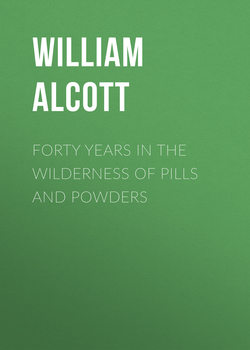Читать книгу Forty Years in the Wilderness of Pills and Powders - Alcott William Andrus - Страница 21
CHAPTER XIX
CHEATING THE PHYSICIAN
ОглавлениеIt was by no means an uncommon thing with me, while studying medicine, to take long walks. One day, in the progress of one of these rambles, I came so near the family mansion of a young man with whom I had formerly been acquainted, that I thought I would, for once, go a little out of my way and make a call on him. And judge, reader, if you can, of my surprise, when I found him exceedingly sick. For residing, as we did, only a few miles apart, why had I not heard of it? Most people, in truth, would have called on some of the young doctors – for there were three or four of us together, – to take care of the sick man, especially by night. Young doctors, I grant – and this for various reasons which might be named, were it needful – are usually the very worst of watchers and nurses of the sick; but the public often appear to think otherwise, and even to prefer them.
I found him under the care of an old school physician; – one who, though he otherwise prescribed very well, gave quite too much medicine; and like the old physician mentioned in the preceding chapter, mortally detested cold water; at least he detested its use in bowel complaints. The young man's case, however, was as yet wholly unlike that of the elderly gentleman of the foregoing chapter; and cold water at first, was not particularly needed; nor perhaps quite safe.
Some few days afterward, I called again. Found my young friend rather less feverish, but no better; in fact, he was much worse, and was most obviously running down. I continued after this to call on him daily, till he too, like the old man before mentioned, began to beg for cold water. But his physician said, "No, not a drop," and with a good deal of emphasis.
One day, while I was at his bedside, he turned to me, and with a most imploring look begged to know whether I believed a very little cold water would really hurt him. I told him no; but that a good deal doubtless would, and might even prove the means of his destruction. "Simple a thing as water is," I said, "it is to you, in circumstances like yours, a sword with two edges. If it should not cut away the disease, it would probably cut in the other direction, to the destruction of your health, if not of your life."
My remarks had both awakened his curiosity and increased his desires for the interdicted beverage. I found I had gone too far, and I frankly told him so. I told him it was not in accordance with medical etiquette, nor even with the rules of good breeding, for one medical man to prescribe for another's patient without his knowledge. But this explanation did not satisfy him. Water was what he wanted; and as I had opened the budget and removed some of his fears, water he must have. He was willing, he said, to bear the responsibility.
Water, then, in exceedingly small quantity at a time, was permitted; but it was to be given by stealth. The physician was not allowed to know it, or, at all events, he was not to know under whose encouragement he acted. His friends were very careful in regard to the quantity, and I had the happiness of finding him, in a few days, very much better. But, as I said in reflecting on the recovery of my aged friend before mentioned, it is not quite certain, after all, how much was effected by the water, and how much by the recuperative efforts of Nature herself. She might have been long waiting for that opportunity to rally, which the judicious introduction of the water, and the partial or entire discontinuance of other medicine, greatly facilitated.
